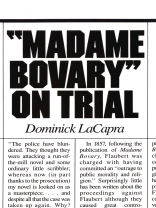In 1857, following the publication of Madame Bovary, Flaubert was charged with having committed an ‘outrage to public morality and religion.’ Dominick La Capra, an intellectual historian with wide-ranging literary interests, here examines this remarkable trial. La Capra draws on material from Flaubert’s correspondence, the work of literary critics, and Jean-Paul Sartre’s analysis of Flaubert. La Capra maintains that Madame Bovary is at the intersection of the traditional and the modern novel, simultaneously invoking conventional expectations and subverting them.
Sobre o autor
Dominick La Capra is Professor of History and Comparative Literature Emeritus at Cornell University. He is the author or editor of many books, including History and Its Limits: Human, Animal, Violence; History in Transit; and History and Memory after Auschwitz, all from Cornell.












